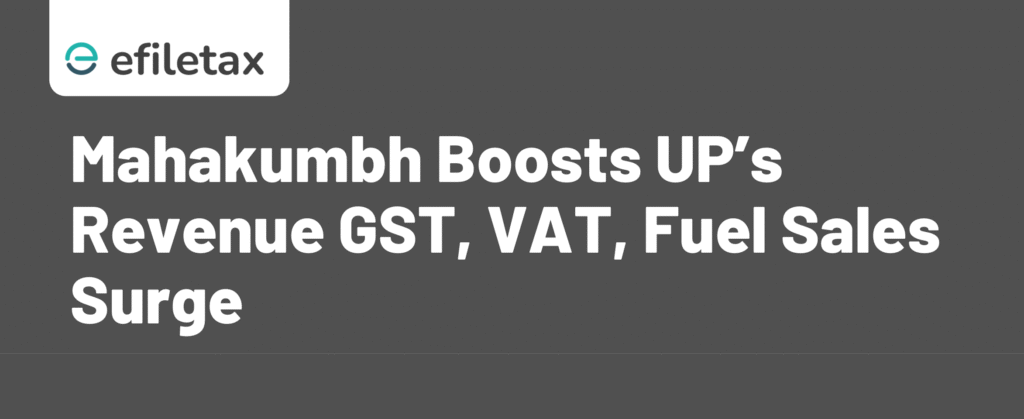
Mahakumbh Ripple Effect: GST, VAT Collections & Fuel Sales Surge in UP
The Mahakumbh tax impact in Uttar Pradesh has gone beyond faith and festivities — it’s reshaping the state’s fiscal landscape. With lakhs of devotees thronging Prayagraj, the economic activity has triggered record highs in GST, VAT collections, and fuel sales.
Let’s break down the ripple effect.
Key Tax Highlights from Mahakumbh 2025
| Indicator | Jan–March 2025 (Prayagraj) | YoY Growth |
|---|---|---|
| GST Collection | ₹1,200 crore+ | ↑ 35% |
| VAT on Fuel | ₹200 crore+ | ↑ 40% |
| Total Tax Revenue | ₹2,300 crore+ | ↑ 38% overall |
| Hotel Occupancy Tax | Significant uptick | Notified soon |
| Petrol/Diesel Sales | 22% increase | Fuel demand spike |
Data Source: UP Commercial Tax Department (via ET and ANI Reports)
How Mahakumbh Triggers Higher Tax Revenue
1. Surge in Tourism Spend
- Influx of 30–40 lakh devotees/month
- Spending on hotels, food, local transport, puja items
- Boost to GST on restaurant and lodging services
2. Fuel Consumption Spikes
- Lakhs of private vehicles, tourist buses
- Petrol and diesel sales jump by 22%
- Result: Higher VAT and state excise
3. Local Business Boom
- Temporary markets set up across districts
- Small traders, food stalls and mobile vendors see record sales
- Many newly registered under GST, widening the tax base
Government Clarification & Legal View
As per GST Act, 2017, events like Mahakumbh are taxable when there is:
- Supply of goods/services for consideration (Sec 7)
- Hospitality and tourism services fall under GST at 5%, 12% or 18% depending on room rent and category (Noti. 11/2017-CTR)
👉 No religious exemptions apply to commercial supplies during the event.
Case Reference: “Sri Jagannath Temple Managing Committee v. CCE” (2019) — held that economic activities around religious functions are taxable when independent of the religious core.
Expert View: A Consultant’s Take
“Large public events like Mahakumbh can act as economic accelerators for state finances. From indirect taxes to employment generation, the fiscal chain reaction is underestimated. Authorities must streamline temporary GST registrations and e-invoicing for mobile vendors,”
— Ajay Bansal, Indirect Tax Advisor, Prayagraj
Benefits for Small Business Owners
- Higher sales = Higher input credit claims
- Eligibility for QRMP or Composition Scheme if turnover increases
- Seasonal GST registration options available under Rule 8 of CGST Rules
GST on Mahakumbh Activities – A Quick Guide
| Service Type | Applicable GST Rate |
|---|---|
| Room rent < ₹1,000 | Exempt |
| ₹1,001–7,500 | 12% GST |
| > ₹7,500 | 18% GST |
| Food & Beverage in hotels | 5% (no ITC) |
| Transport (non-Govt) | 5% or 12% |
| Event management, tents | 18% |
One Ripple, Many Gains: The Broader Mahakumbh Tax Impact
- Boost in employment through contractual jobs and vendors
- Rise in e-way bill generation across Prayagraj and nearby towns
- Opportunity for compliance education among small traders
Summary
Mahakumbh tax impact in Uttar Pradesh leads to 35–40% rise in GST and VAT collections. Tourism, fuel sales, and hotel services drive revenue surge. Explore how faith met finance.
FAQs
Q1. Is Mahakumbh GST-exempt as a religious event?
Only the religious rituals are exempt. Commercial activities like hotel, food, fuel, and transport are taxable.
Q2. Can small traders register for GST temporarily?
Yes. As per CGST Rule 8, short-term business owners at fairs or events can get seasonal GST registration.
Q3. Does the state government get both GST and VAT?
Yes. VAT is applicable on petroleum, while GST applies to services and goods. Both contribute to state revenue.
Final Word
Events like Mahakumbh show how festivals can translate into fiscal strength when supported by compliant, transparent taxation. At Efiletax, we help small businesses and traders register under GST, manage filings, and stay compliant — whether seasonal or permanent.